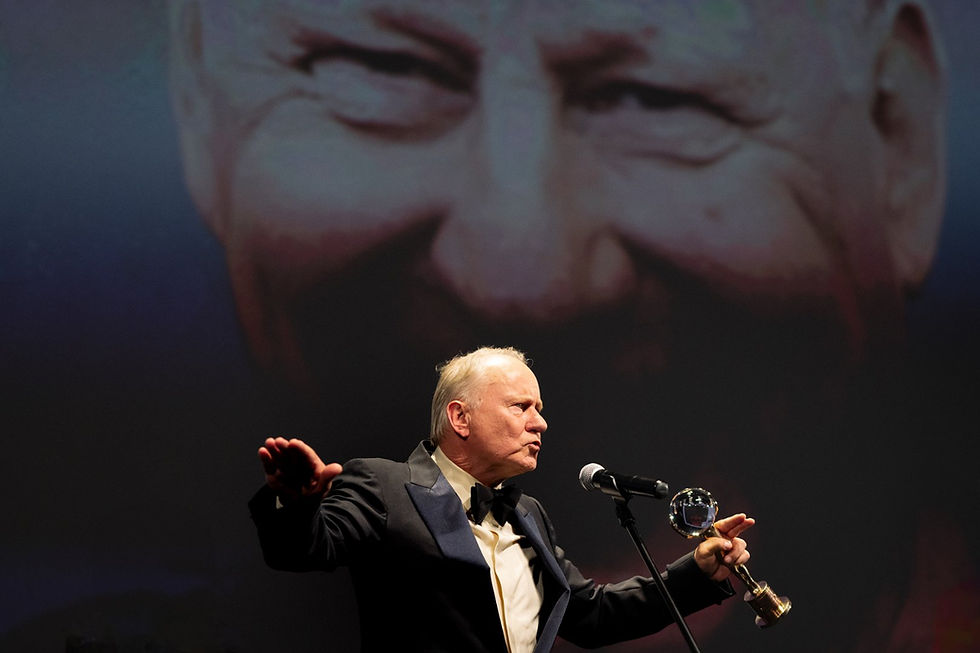Gary Lewis: From Glasgow’s Streets to Global Screens
- Stream Close Up
- Sep 27
- 4 min read

Gary Lewis’s path to international recognition is anything but typical. The Scottish actor, now widely known for his powerful performances in Billy Elliot and Gangs of New York, came late to the craft. He traded in jobs as a street sweeper and librarian for community theatre, improvisational workshops, and eventually a career that placed him alongside some of the most celebrated names in cinema.

Growing up in Easterhouse, Glasgow, Lewis never saw a clear road into acting. “At 15, basically at 15, I didn’t know where the door was to get in,” he has said. What he did have, however, was a teacher who opened a window. Murray Learment, an English teacher at his secondary school, founded a film club and exposed students to classic British social realist films. “Kes exploded for me,” Lewis remembers of Ken Loach’s 1969 masterpiece. For the first time, he saw a life on screen that resembled his own community raw, ordinary, and real.
Still, acting would remain a distant possibility for many years. Lewis worked a variety of jobs but kept close to theatre as an audience member. Plays like Death of a Salesman struck a chord. “That made a huge impact on me,” he recalls. His first steps on stage came in a community drama about John McLean, a Glasgow teacher and anti-war activist. It was amateur in name, but transformative in practice: “Nobody was trained, but… I used to walk home from rehearsals with my head completely buzzing. It was terrifying on stage… but you learned a lot.”
The real shift came in his early thirties, when he joined Robert Carlyle and Caroline Patterson at Raindog Theatre Company. Lewis describes the experience as thrilling and intimidating in equal measure, a crash course in improvisation and character work. Shortly after, he began appearing in Scottish short films, often collaborating with Peter Mullan. “That was my university,” he says. “I got the flying hours doing these short films.”
By 1999, the leap from fringe theatre to global cinema was complete. His performance as Jackie Elliot, the conflicted father in Billy Elliot, brought him international acclaim. It also caught the attention of Martin Scorsese, who cast him in his epic Gangs of New York (2002). On Scorsese’s vast set, Lewis not only held his own starring as McGloin opposite Daniel Day-Lewis and Leonardo DiCaprio, but also brought ideas to deepen his character. One memorable detail, the harmonica McGloin carries, was his suggestion. The simple prop gave his rough-edged gang member an inner life, hinting at an identity beyond violence. It was a small choice, but one that revealed the instincts of an actor who understood how texture and humanity could be woven into even the most brutal roles.

Since then, Lewis has built a résumé that straddles film and television. Audiences have seen him in Nicolas Winding Refn’s Valhalla Rising and he reports that he is most often recognized for his turn as Colum MacKenzie in the global hit series Outlander. His performances are often rooted in the same ethos that first inspired him: stories of ordinary lives told with extraordinary honesty. “Seeing Kes and films from that era made me realize that there was a huge absence in most representations… working class characters featured in the background or didn’t feature at all,” he has said. His body of work continues to push against that absence.
Despite international success, Lewis has often expressed a quiet frustration that Scotland has yet to carve out its own cultural wave in television drama, the way Scandinavia did with The Killing, Borgen, and The Bridge. “We’ve got the stories, the history, the characters,” he has noted. “What we’re missing is the run of productions that lets the world see Scotland the way Scandi Noir put Denmark and Sweden on the map.” It’s a longing for momentum and for Scottish drama to break out not as isolated successes, but as a sustained, distinctive movement.
Lewis remains modest about his trajectory. “Some people were quitting by the time I was starting,” he jokes. But his so-called late start has given him a unique presence grounded, lived-in, authentic, that resonates deeply on screen.
Recent years have seen him take roles in acclaimed television dramas such as Vigil, Granite Harbour, and Franklin and he is just coming off a 3 episode arc as Jack Mac in Steven Knight’s A Thousand Blows. We’ll get a chance to see him in The Undertow which is about to be released on Netflix. In addition, rumor has it that we will see him appearing in the just released Down Cemetery Road from AppleTV+, as Lewis was sighted in Newquay aboard a boat filming with Emma Thompson and Ruth Wilson late last year.
For an actor who once wondered where the door into the profession even was, the image of Gary Lewis today, sharing a set with Britain’s finest, on an international streaming platform says everything. His story is proof that it doesn’t matter when you begin, only how fully you commit once you do.




Comments